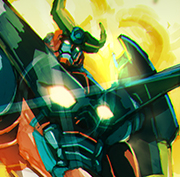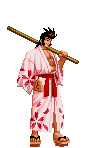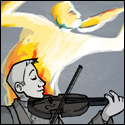|
pookel posted:Sorry to just jump into the thread, but ... Start by raising the encounter budget, a well made party can make the game seem easy. While I've fudged results in other editions (i.e. the gorgon turns you to stone, luckily there's a scroll to reverse it nearby in the next room), 4e doesn't really need that. Also, 4e's combat is probably at its best when the dm tries to k.o. the party, since in general it's balanced for it. So while in general I think your advice would be practical, I think it's a simpler matter in this case to just make encounters harder by raising the budget and adding more and/or tougher monsters. pookel posted:It's all premade adventures The above still applies. If he doesn't change anything, nothing will change (obvious I know, but yea). Start stapling "Elite" to things, pump out more minions, etc. These changes shouldn't affect the adventure paths themselves, it just involves things like putting down 7 goblins instead of 5 (or substituting 2 elites, etc.).
|
|
|
|

|
| # ? May 13, 2024 23:04 |
|
Yeah 4e is so tight that we had a DM who is VERY experienced with d&d build encounters fairly and do his absolute damnedest to wipe the party every single combat. It was completely fair and he absolutely killed some party members over the course of the campaign, but it was fun and intense as poo poo and nobody got their feelings hurt.
|
|
|
|
I always build my encounters to be fair, but I play them as unfairly as possible. You can try to win in 4e as the DM in the actual combats as long as you're building/pacing your encounters properly. It's kind of the point.
|
|
|
|
Back off the advice to start fudging things, some people might run games that way but by no means does that make it a good way to run a game. 4e maths actually works and it's pretty tight, so to change things just change the encounters like everyone is saying. Don't start saying the monsters are hitting when they're not.
|
|
|
|
To be clear, he reacts the same way to suggestions he should change the printed encounters by making them harder. He's treating the adventure as set in stone, a game of him against the party and not a thing he's in charge of adjusting to make things more fun.
|
|
|
|
This is kinda sounding like not a good DM. It's one thing to dislike encounters being easier than they're supposed to be, but refusing to do anything about it either is just insisting on misery.
|
|
|
|
Yeah, like half the point of having a GM is to adjust stuff so the game is fun. GMing is a blast though, you should give it a try, though try not to make it an adversarial, "We hate how you GM so I'm doing it now" thing. Maybe suggest that he'd enjoy being a player more? Alternatively, point out that the party is supposed to win, and his job is just to make the players work for it a bit? Gort fucked around with this message at 06:14 on Apr 17, 2016 |
|
|
|
Pookel, you yourself seem to have a good grip on how this is supposed to work. Why don't you trade off with your DM for a session? There's nothing wrong with always rolling everything out in the open, but it's part of DMing to accept that you're generally meant to lose, but also that you're within your rights to make the losing as "by the skin of their teeth" as the players are comfortable with.
|
|
|
|
pookel posted:Sorry to just jump into the thread, but ... Tell him to shut up and kill you already.
|
|
|
|
pookel posted:To be clear, he reacts the same way to suggestions he should change the printed encounters by making them harder. He's treating the adventure as set in stone, a game of him against the party and not a thing he's in charge of adjusting to make things more fun. You can't really be a DM if you're frustrated by missing. I think I need a better idea of how much you guys are wrecking the printed encounters. Do you feel like this behavior is appropriate to what is happening at the table? If you're asking, I'm guessing the answer is no. There is no way to fix lovely behavior with gaming advice. Tell him to stop being lovely or to take a bench.
|
|
|
|
Your DM is being weird and whiny. You need to solve the personal problem there then move onto the game mechanocs. Moving on to the game mechanics, the canned adventure paths are designed for low to moderate optimisation adventurers. The guy who authored the Zeitgeist AP recommended giving monsters a flat +1 to hit and a damage boost across the board of the party is built to sensible guidelines (e.g. 20s in attack stats, synergistic feat choices). The other option I like is to use this as replacement for the standard damage values: http://dmg42.blogspot.com.au/2012/02/boot-on-face-of-level-1-damage-forever.html?m=1 This makes the combat as dangerous as 1st level. I'm current DMing two AP: zeitgiest and war of the burning sky. Zeitgeist I am using the monsters 'as is' but increasing minion counts and adding either 1 normal or 5 minions to every fight. In war of the burning sky I am converting the monsters to use those damage expressions. Both seem to make for very tough combats, but less monsters who hit harder is a bit faster if that's a concern.
|
|
|
|
I also don't think you mentioned what module you're playing or how many players you have. For the first thing, some of them were not very good, and most of them came out before they revised the monster math around MM3. The updated math reduced enemy HP and increased their damage to try to make fights more intense. The newer stuff is a lot better, especially when using the more interesting monsters from the Monster Vaults. For the second, most modules were written to assume 5 PCs. If you've got more then it's a really good excuse to tell him to add a monster or two to each fight. And if your party is at all optimized even a 4 PC vs a 5 PC budget will get stomped.
|
|
|
|
|
Really a DM should be a fan of the players. If you've somehow managed to assemble a super powered strike force that laughs at level appropriate encounters, the appropriate response is "Wow! Good job!" And then bring out the big guns.
|
|
|
|
That's really the only way to play 4e. You'd be surprised how far you can push it too. I could send a solo two levels higher than the party as soon as level 2. Throw in some overleveled Brutes and really bring the pain while still being within the proper to-hit range of the players. I just wish the MM3 and on monster manuals actually had elites under level 6. It's really easy to make my own, I know, but I usually go the lazy DM approach and pull appropriate level premade monsters most of the time, especially since I already have MM3, DSCC, and both Monster Vaults. New favorite monster, by the way? Crauds from MM3. Used them as giant crawfish in the swamp outside Fantasy Colonial New Orleans. Almost drowned the Ranger.
|
|
|
|
pookel posted:It's all premade adventures - we're going through a book campaign. I don't think that's terrible per SE considering none of us ever played 4e before, but it adds to his insistence on playing it exactly as written even when it's unbalanced. No one has asked the obvious question. Which book campaign? They upgraded the 4e monsters after a couple of years because they actually were too weak.
|
|
|
|
neonchameleon posted:No one has asked the obvious question. Which book campaign? They upgraded the 4e monsters after a couple of years because they actually were too weak. Someone actually asked that already
|
|
|
|
neonchameleon posted:No one has asked the obvious question. Which book campaign? They upgraded the 4e monsters after a couple of years because they actually were too weak. i'm gonna say that it doesn't matter because that's not the real problem IMO the gm is getting upset that he isn't winning which is weird to me because as a gm even if you're going hard in a game built for it like 4e you shouldn't actually want to win because it's a game over. the objective should be to provide an appropriate challenge to me it sounds like the guy is acting like he picked a bad wargame army or something.
|
|
|
|
Well, it turned out that we finished that book (I wish I knew the name of the campaign, but we haven't talked about it much - I can tell you that at around level 8 we were in the Pyramid of Shadows, and at level 13 we just finished this whole storyline involving a troll king who was using a magic cauldron to resurrect himself repeatedly) and one of our other guys is going to DM the next time, so whew. This particular guy has never been seen to get pissy about, well, anything, and he's very good at the number crunching, so I expect less drama at the least. I posted here partly just to get a "wait, am I crazy or is this hosed up?" check and I think it was pretty hosed up. Like, during the end boss fight, he threw his pencil on the table and said "I don't even see the point of doing this fight! I can't even hit you guys!" So the next guy should be reliable not to do that sort of thing .... but I still feel like he doesn't quite "get" DMing. Everything is very transparent (like, we're always told everyone's rolls and everyone knows what abilities the monsters are using and how much damage we're doing) and it sort of feels like playing a video game, where you can see other players' hit points and monsters have red life bars over their heads. Is this normally how 4th feels, or is it something we could be improving? I can't DM for practical reasons (I host and have two children, and I have to duck away sometimes to deal with them) but I'm trying to convince my boyfriend to volunteer to DM the next book after this upcoming one. He is an old-school gamer like me and believes in the secretive, godlike powers of the DM to make things work smoothly rather than following rules blindly. Incidentally, everyone in the group is a Magic player - we actually met as an EDH group originally. I think this might influence some of the attitudes toward the game. They're used to crunching numbers, but not to roleplaying (only to videogame RPGs).
|
|
|
|
pookel posted:Everything is very transparent (like, we're always told everyone's rolls and everyone knows what abilities the monsters are using and how much damage we're doing) and it sort of feels like playing a video game, where you can see other players' hit points and monsters have red life bars over their heads. Is this normally how 4th feels, or is it something we could be improving? You can play a game where you reveal a minimum of information to the players, except maybe if the monster is specifically Bloodied or not, and any ability that demands you know a stat for it to work (and only when that ability is used), if you really wanted to. It's really up to your group's specific taste as to what works for them. Personally I err on the side of telling the players more information than less. After the first hit, I let them know what the actual defense number is. I don't usually say exactly how much HP is left, but I give more precise descriptions like "almost dead" or "barely scratched". I do this because knowing about the monster ideally lets you plan around what it might do: if the monsters are a black-box, then there's nothing for the players to decide with besides "hit it again". If, on the other hand, you know that it's weakest defense is Will, that's something that the party can work with as far as the Wizard beelining for it. There's a bit more incentive for the players to know the stats of the monsters in 4th edition because tactical combat, but even in other games this still applies. If the Fighter tries to attack a dragon and you come back with "nope, sorry, AC 43", that can be a better clue-in to the kind of poo poo the players have gotten themselves into than whatever florid description you might be able to write.
|
|
|
pookel posted:Everything is very transparent (like, we're always told everyone's rolls and everyone knows what abilities the monsters are using and how much damage we're doing) and it sort of feels like playing a video game, where you can see other players' hit points and monsters have red life bars over their heads. Is this normally how 4th feels, or is it something we could be improving? Running the premade by the book after it's evident that things aren't working is a little weirder, but it may just be a rookie mistake. If you don't know exactly how all the pieces are supposed to fit together it can be intimidating tweaking things in a system as heavy and transparent as 4e, because it'll be evident really fast if you mess it up. Plus he may just not be jaded enough yet to know that a large portion of premade modules are poo poo, regardless of system (but especially for 4e). Best of luck with the next DM!
|
|
|
|
|
pookel posted:Everything is very transparent (like, we're always told everyone's rolls and everyone knows what abilities the monsters are using and how much damage we're doing) and it sort of feels like playing a video game, where you can see other players' hit points and monsters have red life bars over their heads. Is this normally how 4th feels, or is it something we could be improving? Example: one of my players has an ability that gives the party a bonus against Charm attacks. It doesn't take an action or any declaration of intent, it just happens. The way I handle that is whenever a monster power has the charm keyword, I add "... and that's a Charm power, Jim" before I make attack rolls. If I didn't he'd have to ask every time there was an attack vs. Will. And since we use Masterplan every PC and monster does in fact have a life bar.  I mean, leaders need to know when an ally is dangerously low on HP, defenders need to know who to protect, PCs with abilities that kick in when an enemy is bloodied need to know that, everyone needs to know when an enemy is so close to zero they could finish him off... there's only so many ways you can dress all that up in in-character banter before it gets stale and you're bound to forget, I'd rather you see it at a glance and imagine it as PCs being competent enough to scan everyone's general status at a glance likewise. I mean, leaders need to know when an ally is dangerously low on HP, defenders need to know who to protect, PCs with abilities that kick in when an enemy is bloodied need to know that, everyone needs to know when an enemy is so close to zero they could finish him off... there's only so many ways you can dress all that up in in-character banter before it gets stale and you're bound to forget, I'd rather you see it at a glance and imagine it as PCs being competent enough to scan everyone's general status at a glance likewise.
|
|
|
|
Maybe I'm just old-fashioned, or maybe I'm not conveying well enough how turns play out. It tends to go like this: The Dwarf With an Axe is out front hacking and hewing and having a fine time. Fifty feet away, the rogue has gotten flanked and is in trouble. So the monk (who's in some other room entirely), whose player is good at figuring these things out, points out that if the healer gives up her standard action and uses two movements, she can get to the rogue to heal him with a minor action before the monsters have a turn (since she is before them in initiative order) and that the dwarf will then be able to charge Monster A on his next turn and push him out of flanking, getting the rogue out of trouble. And then the monk leaps into the room on his next turn and uses his action point to be able to get to the fight which he shouldn't even have been aware was happening. The DM helps the players coordinate all these things by letting them know which squares are going to be difficult terrain and whether the monsters have threatening reach and so on. This isn't, like, an occasional thing where a new player needs help and asks more experienced players to give advice on how to use their turn best. This is every goddamn turn. It's frustrating. But I don't know how to do anything about it besides "nag the DM to enforce a certain level of realism here."
|
|
|
|
The two warning flags (not even red flags) I see in your story are: 1. The Monk joining into a fight that maybe he shouldn't have been aware was going on, but how "unrealistic" this is can vary depending on the specific circumstances and how much of a stickler the group is. 2. The Monk player or the DM being "backseat drivers" if they're ordering around the players to do stuff that they know is optimal. That could get grating. Maybe that wasn't what they were doing. Otherwise, all that other stuff you're describing: 1. The healer double-moving into range of the Rogue and using a Minor Action to heal 2. The Dwarf using a forced-movement attack to knock a monster into a square that disables flanking Is exactly the kind of tactical thinking that people generally like playing 4th Edition for. Knowing which squares are difficult terrain is correct for the DM to point out, because it informs the players' choices as to where to go and how to conduct the battle. Knowing what moves will trigger OAs because of threatening reach is also something that the DM should be telling the players about, because it's lovely to go "ah ha! you did not remember that this soldier was using a polearm! I will OA you now!" to a player.
|
|
|
|
pookel posted:Maybe I'm just old-fashioned, or maybe I'm not conveying well enough how turns play out. Some people don't really care about realism in their fantasy game, and the operative word there is game. The kind of game you seem to want to play is an immersive fiction-driven one. If this bothers you, but you're in a minority at the table, idk what you expect to happen. I wouldn't call you old-fashioned so much as the table seems to want different things out of the game. I mean you've described a typical scenario when I played 4e and my table loved it; I've also played 1e, 2e, and Dungeon World with similarly game-y results.
|
|
|
So, there are several different things going on here, and most of them boil down to table preferences.pookel posted:So the monk (who's in some other room entirely), whose player is good at figuring these things out, points out that if the healer gives up her standard action and uses two movements, she can get to the rogue to heal him with a minor action before the monsters have a turn (since she is before them in initiative order) and that the dwarf will then be able to charge Monster A on his next turn and push him out of flanking, getting the rogue out of trouble. It's a potential problem with a lot of cooperative board games, and there are a few ways of dealing with it in rules mechanics (hidden info that isn't shared, setting a time limit on planning, etc), but D&D doesn't really have any of them as long as the QB knows what every PC is capable of. But I don't really see anything wrong with the fact that the Monk was in a different room as far as the advice goes. Tactical games like this can be a group puzzle if that's how the group wants to play them. pookel posted:And then the monk leaps into the room on his next turn and uses his action point to be able to get to the fight which he shouldn't even have been aware was happening. Again, that's a table preference thing though. Once the minis hit the table a lot of people toss roleplaying out the window. And that's fine if everyone's onboard. If you're not digging it maybe just talk to the group, and say you'd like to try to stay in character a little more even in combat. pookel posted:The DM helps the players coordinate all these things by letting them know which squares are going to be difficult terrain and whether the monsters have threatening reach and so on. Threatening reach is an open question, but again it could be argued that experienced fighters would know when it's dangerous to move around an enemy with a reach weapon.
|
|
|
|
|
It's less the actions that bother me and more the fact that we sit around discussing strategy for 20 minutes every time someone takes a turn that's supposed to last 6 seconds of real time. Nobody objects to getting advice - it's more that they're treating every person's turn as a group effort where we all have to figure out that person's absolute optimal move, then suggest they make it, then read over their powers, then let that person make the final decisions, and then the thing happens. It's never just "You hear fighting in the next room. What do you do?" "I leap in and use my action point to hit that guy there!" It's "OK, wait, don't take that route, that puts you one square too far over. If you go to this square here, and then use this power, you'll be able to go exactly far enough to land in this spot, and that'll be optimal for me when my turn comes around." I did most of my adult D&D playing with a pretty grognard-y 2e group of grumpy dudes, and even there I complained if we spent too much time roleplaying and didn't get to fight. I *like* combat ... I just like combat that feels like combat, instead of spending 3 hours helping six other people micromanage every moment of a five-minute troll fight. Maybe I should see if they'd let me run a one-evening special event where I show them how we used to do things, so at least they get an idea for the feel of it. The thing is, I'm not sure they like this either - everyone complains that turns are slow and we never get to roleplay. They just don't know how else to do it.
|
|
|
|
Another thing to keep in mind with the monk's player's quarterbacking is that even if his character is in another room entirely, having the player who's best at tactics lending a hand at the meta level with other people does a decent job of simulating how seasoned adventurers would be behaving (since if they're alive for any length of time and working together, the whole group of characters-not-players probably have a decent grasp on how to comport themselves in fights). Like, maybe the rogue's yelling HELP HELP OWW OWW HURRY and the healer knows/decides that's code for "drop everything to go keep the rogue alive, sounds like he's in a bunch of trouble." Now, if the rest of the table just wants to do them and not hear tactics dictated to them, that's another conversation, but if it's more your concerns of realism, then...isn't it more realistic that competent adventurers know what to do to keep on adventuring, together?
|
|
|
|
gradenko_2000 posted:Otherwise, all that other stuff you're describing: This all seems very strange to me considering that this is supposed to be fast-paced combat - we shouldn't be having a huddle every round and assigning actions to everyone in advance.
|
|
|
|
Low level 4e is certainly slowed down by heavy group tactics talk, this is much less of an issue when you're level 25 and combats are now taking 5 hours in addition to the two minutes each individual is taking to plan out their turn as it comes up. Very little about 4e combat is fast paced unless the group is a well oiled machine intimately familiar with all the abilities of their fellow members.
|
|
|
|
I'd be surprised if that's happening every round. It's probably only happening when the chips are down, but you remember it much better when the chips are down.
|
|
|
pookel posted:Maybe I should see if they'd let me run a one-evening special event where I show them how we used to do things, so at least they get an idea for the feel of it. The thing is, I'm not sure they like this either - everyone complains that turns are slow and we never get to roleplay. They just don't know how else to do it. It sounds like 4e just might not be the game for you guys. The big indicator for me is that most of the rest of the table is willing to go along with the Monk's ideas. It shows me that they may not be engaging with the tactical puzzle. You guys may be more interested in a more narrative game like Dungeon World, Fellowship, or Fate.
|
|
|
|
|
I'd like some help brainstorming about solos. I'm running War of the Burning Sky for some brave goons and as others have mentioned, the solos in that are pretty much complete poo poo. I know that at a baseline, all solos should generally have
|
|
|
|
I'm starting to get a better picture of where you're coming from. Yes, you're correct that while that's the correct tactical decision to make, ideally the person would be able to make up their mind to do it and commit to it within the span of their one turn. The only real solution though is to be open and honest about your issue. Trying to do something like "you can only say five words worth of coordination" or "you have 10 seconds to make up your mind" is going to feel punitive unless the whole group agrees to try it out beforehand. As a DM maybe I would say something like "guys, I'm not out to get you. Throw yourself into the fight, you don't have to preplan every action" and hope that spurs them into action. For what it's worth I've never quite run into the "player doesn't know what to do by the time his turn comes around" problem, except maybe if I'm deliberately throwing mysteries and curveballs into an encounter. Another thing I'd think about doing would be implementing Popcorn Initiative as a way to foster teamwork by letting the group hand-off coordinated actions in whatever order suits them best, rather than having to process a specific turn sequence. kaynorr posted:I'd like some help brainstorming about solos. Just flat out give them more Standard Actions, with perhaps a limitation like Bonus Standard 1 having its own separate initiative count (or a simpler one being that it goes off after a player's turn). You don't necessarily have to justify it in-universe. The boss orc is an orc. A big orc. But he gets to move four times because it's a game and it's what the game needs. gradenko_2000 fucked around with this message at 17:34 on Apr 18, 2016 |
|
|
|
thespaceinvader posted:I'd be surprised if that's happening every round. Might be my grognard showing, but where I get stuck is how unrealistic all this is. "In a real fight you're not all telepathic! You can't see the future! You don't get the luxury of asking everyone else if your idea is a good idea before you do it!" I mean, yeah, if a player is trying something new or needs rules help, sure. But when every round (really, every round) has people asking stuff like "would you like me to come over there and set up flanking for you?" it doesn't seem right to me. It's not so much "my immersion!" as it is that it makes combat so drat boring, and removes most of the opportunities for people to surprise the rest of the party by coming up with something cool on the spur of the moment.
|
|
|
|
gradenko_2000 posted:I'm starting to get a better picture of where you're coming from. I wonder if "discussing strategy is now a minor action" would be a possible technique here.
|
|
|
|
kaynorr posted:I'd like some help brainstorming about solos.
|
|
|
|
I think weighing in with tactics is fine, even if your character isn't in a position to do it, but yeah I totally get you on the "optimize every single turn" bit. It's super annoying when it happens with any kind of regularity. Particularly when it's always one guy doing it. To a degree it happens all the time though. Stuff like where the difficult terrain is should absolutely be on the table up front, and around my table you regularly get "hey, if you move here instead, Joe can flank on his turn" or "I'd attack the other dude, he's got like 5 HP left." And half the time that comes from me as the DM. Kinda only makes it harder to put a stop to it when people pull out all the stops and essentially start playing other players' turns for them, but them's the breaks. There's a common trick to speed up turns which is "if you know what to do when your turn starts, and you play it straight through, you get a +1 bonus to attack rolls" and maybe that could be adapted? pookel posted:In a real fight you're not all telepathic! 
|
|
|
My Lovely Horse posted:I guess having a Kalashtar with Group Mindlink isn't helping It's like the difference between NBA level basketball players and a bunch of nerds who have never dribbled a ball sitting around the table playing a basketball board game.
|
|
|
|
|
pookel posted:Maybe not *literally* every round, but it happens all the time, including when nothing important is going on. People don't even just make their own decisions to explore a room - they have to stop and ask each other about tactics beforehand. This isn't a fight. It's a game. The players' knowledge is not the characters'. The players and you are jointly telling a story about the characters. It shouldn't take but a moment to work out an explanation for why a character in another room might abandon his fight and go join his friends, anything from 'hearing someone yell' to 'I have a bad feeling about this' to 'divine inspiration' to 'actually we DO have telepathy, here's why'. But making GBS threads on good tactics because 'your character has no way of knowing that' ignores the basic premise of the game. My character has no way of knowing I'm about to miss with an attack because I rolled a natural 1, so why would I use Elven Accuracy? (I actually agree about optimising every action and every turn, but that's a different problem altogether)
|
|
|
|

|
| # ? May 13, 2024 23:04 |
|
Quarterbacking is a potential problem in any game. I've even seen it in more story-heavy games ("Why didn't you tell my character this?"/"You should say this to that NPC") but it's really obvious in tactical games because the decision points come fast and furious. There's really no right or wrong answer but most gamers should err on the side of less quarterbacking rather than more. One of the most important features of 4e is the combat and if you're trying to deprive other players of their right to pick a course of action on their own or create an atmosphere where anything less than the best, preordained choice is the wrong choice, you're making the game less fun (and take more time!) as a result. Tell your monk's player you'd rather make your own decisions each round and that he should be cool with that. Don't let the pressure to pick the 'best' action get in the way of fun. Having one person constantly 'solving' everyone's actions is the highway to shittown.
|
|
|




































